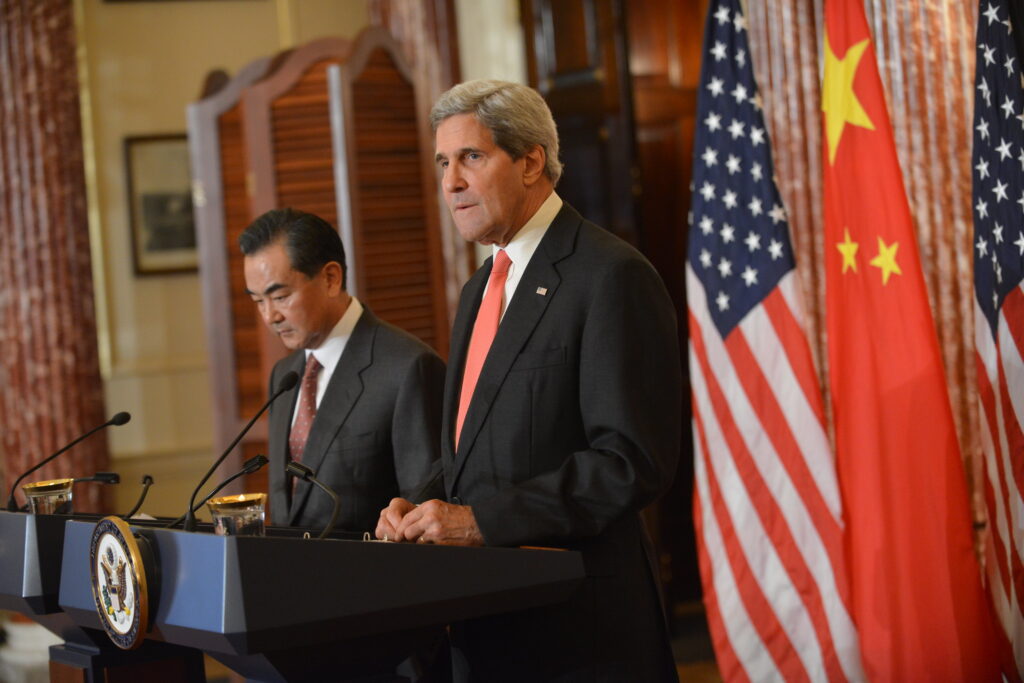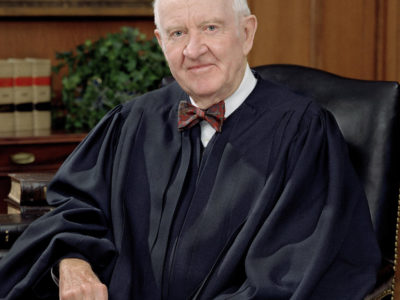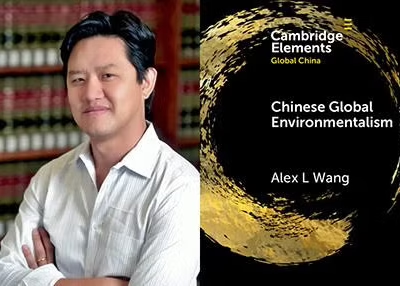John Kerry’s China Visit was a Success (Sort of)
There was no big climate announcement. But that wasn’t really the purpose of the U.S. climate envoy visiting Beijing.

U.S. climate envoy John Kerry just wrapped up three days of talks with top Chinese officials in Beijing and doesn’t have a lot to show for it: There was no joint agreement or grand bargain. Chinese officials did not signal willingness to commit to a speedier timetable for cutting their greenhouse gas emissions or slowing down their building boom of coal-fired power plants. Nor did they show willingness to separate the urgent issue of climate change from the broader tensions clouding the US-China relationship.
But the reopening of climate negotiations during this visit is a positive development with hidden benefits, according to Alex Wang, faculty co-director of the UCLA Emmett Institute.
Wang recently returned from his own visit to Beijing. I spoke to him about what this diplomatic moment means for the prospect of international action on global warming in the months ahead.
What is the important context to Kerry’s trip, and did you see signs of progress?
The fact that the U.S. and China are talking about climate change again is absolutely essential. We’re all aware of the physical signs of climate change that are hitting us: the extreme heat, the wildfires. So that’s the context in which the leaders of the two largest emitters were meeting. The U.S. and China hadn’t been talking for some months after the controversy around Rep. Nancy Pelosi’s visit to Taiwan.
The political discussion in the U.S. has been focused on whether Kerry can force China to change its policies and in particular its relationship with coal. In the last few years, China has instituted a policy that revived coal. The Chinese have a slogan “Build it before you break it.” Xi Jinping himself said this and the message to the system was ‘don’t rush to go all renewables,’ which led to a lot of local permitting and construction of coal-fired power plants. This has been justified on energy security grounds and justified on the need to provide back-up power for intermittent renewables. In Beijing there is a lot of discussion among environmental experts that these economic concerns and energy security concerns are making climate policy implementation more difficult. So that’s a challenge to this premise that Kerry could go to Beijing and somehow force China to change that very fundamental economic and energy policy.
I think Kerry is well aware of this and that his team also understands the risk of political backlash within China that if the U.S. is pushing for certain things there might be a backlash in China that goes something like ‘We shouldn’t do those things because there must be some reason the U.S. wants us to do that.’ So, it has to be handled in a diplomatic and delicate way.
The conversation between the two countries has a number of purposes: one is to find out where China is on all these issues of major concern. Where are they on methane? Where are they on the clean energy transition? Where are they on coal? What do they say about the reasons they’re doing these things that the world is concerned about? That basic understanding we’ve lost a bit of because of COVID and because of geopolitical tensions.
Kerry didn’t meet with leader Xi Jinping and there wasn’t any big joint announcement, what do you make of that?
Chinese leaders have made it a point to signal that they are taking climate change actions on their own initiative. Xi Jinping said at a domestic environmental conference this week that China’s commitment to its climate goals was “unwavering,” but “the path, method, pace and intensity to achieve this goal should and must be determined by ourselves, and will never be influenced by others.” In some ways, the last thing they would want to do is give Kerry a victory he could take home. If China plans to make a climate announcement in advance of this year’s COP28, I expect it would come at a place like the UN General Assembly meeting in September.
What does this all say about the balance between competition and cooperation?
When Pres. Biden came into office there was a lot of talk about the return of international cooperation being essential. I and a number of other people tried to reframe the debate to say it’s not only about cooperation–competition also plays an important role.
And the US has moved forward on climate change at the federal level with a significant competitive component with China. The Inflation Reduction Act is largely about bringing manufacturing back to the US, creating more diverse supply chains motivated by the concern that China has dominated the clean energy and electric vehicle supply chains. In some ways that sense of competition was necessary in the Inflation Reduction Act.
But cooperation is important to make sure that competition doesn’t go off the rails in a destructive manner. We’re in a world where both are at play. At the core of this issue is not a question of whether Kerry and Xi strike some sort of agreement. The core of the issue is whether the US and China can actually decarbonize in their respective countries. In the U.S. with the passage of the IRA and a few other laws in the last few years, we actually have a much stronger path forward and it’s all about how well we implement that and what further we do to hit our targets. In China they have long-term targets: they have their 2060 carbon neutrality target, their 2030 carbon peaking target, and the question is how effectively they move forward with those targets, and how each side meets their goals.
You visited Beijing for 2 weeks in June. What struck you about how Chinese environmental policy has changed since you were there a few years ago?
The change in the electric vehicle rollout was stunning. What I saw in Beijing was an absolute transformation from the pre-COVID era from when there were not a lot of EVs on the road to now almost the entire local taxi fleet had been converted to electric vehicles, as well as a lot of the passenger cars and delivery trucks. That shift, driven by China’s industrial and regulatory policy, has been dramatic and it’s not something we’d be aware of because we don’t really have Chinese passenger cars on the market but these Chinese vehicles are being exported to much of the world. China has recently become the largest exporter of cars in the world, ahead of Japan, and many of these are electric.
One of my other top-level takeaways was there’s a real appetite for engagement from the Chinese side. There were many international visitors over the summer and all the environmental experts are eager to reengage and work together on joint problems. I was also recently part of a Track 2 dialogue in Los Angeles and it was the first time we had key deep conversations with key research level people from China for some time and it was absolutely indispensable, just to get a sense of where they stand and to what extent the barriers on the Chinese side are technical, informational, are they political, economic.







Reader Comments